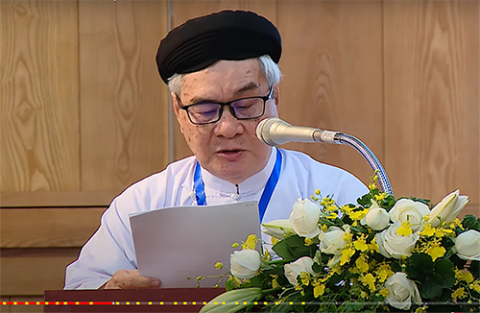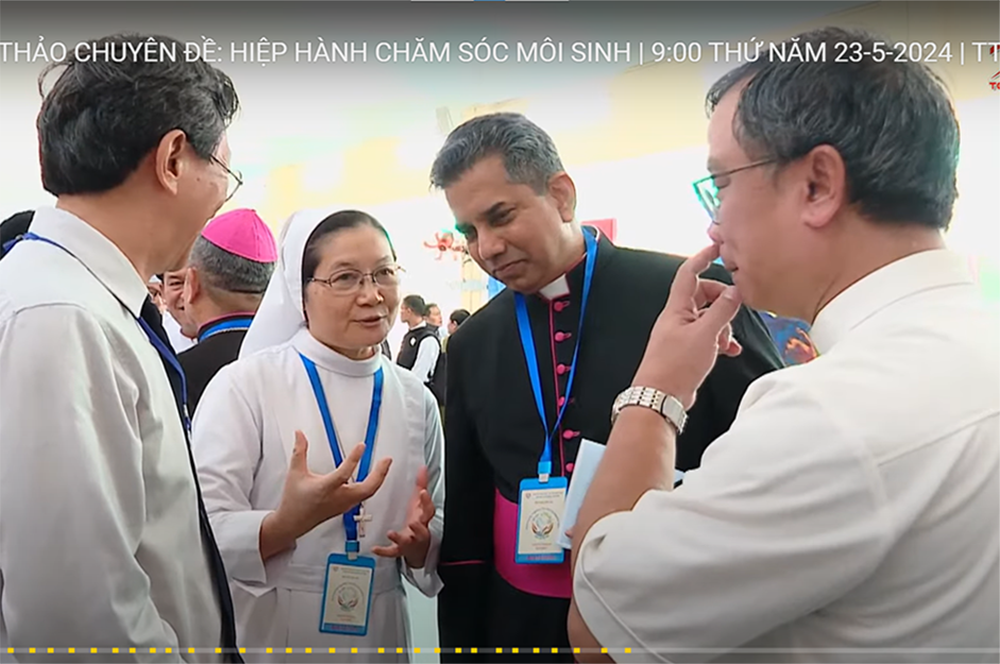
Msgr. Indunil Janakaratne Kodithuwakku Kankanamalage (in black) talks with participants at the gathering on May 23 in Ho Chi Minh City. (Screenshot/Joachim Pham/hdgmvietnam.com)
Ecological education and spirituality among religious followers are key to addressing environmental problems, according to speakers at a recent interfaith gathering in Ho Chi Minh City, Vietnam, to mark the ninth anniversary of Pope Francis' encyclical "Laudato Si': On Care for Our Common Home."
The gathering, "Journeying Together for Environmental Care," drew 450 priests, pastors, nuns, monks, dignitaries and laypeople from Baha'i, Buddhism, Catholicism, Protestantism, Islam and Indigenous faiths of Caodaism, Hoa Hao and Minh Ly Thanh Hoi.
The May 23 event was held by the Office for Ecumenical and Interfaith Dialog of the Catholic Bishops' Conference of Vietnam and the Ho Chi Minh City Archdiocese. Present at the gathering, aired live on social media, was Sri Lankan Msgr. Indunil Janakaratne Kodithuwakku Kankanamalage, secretary of the Pontifical Council for Interreligious Dialogue, and three local bishops.
Bishop Peter Nguyen Van Kham, a speaker, said natural resources belong to all people, so the way we deal with the environment will have significant repercussions for future generations.
"We must respect nature because all creatures are gifts of God's love. We are invited not to exploit all creation excessively but treat them like sacred gifts we must cherish," Kham said.
Advertisement
The bishop of My Tho Diocese in the Mekong Delta in southern Vietnam said local farmers previously would tend to one rice crop per year, but now they cultivate 2–3 crops annually, resorting to increased chemical fertilizers and pesticides. Consequently, the soil becomes depleted fast, and the water source is contaminated, leading to health issues — including cancer — among the local populace.
"We are entrusted with the task of nurturing, protecting and preserving all creatures," he said.
Kham stated humans and nature are interdependent on one another, so people can draw from nature what is necessary for their lives, but at the same time, they must preserve and care for nature.
He warned that consumer societies stimulate consumption and create artificial needs for their members. Saying natural resources are meant for the benefit of all, he urged people to prioritize sharing over selfish exploitation.
"Environmental stewardship is deeply intertwined with ethical conduct. By overcoming individualism and selfish motives, we can foster profound societal changes," he said.
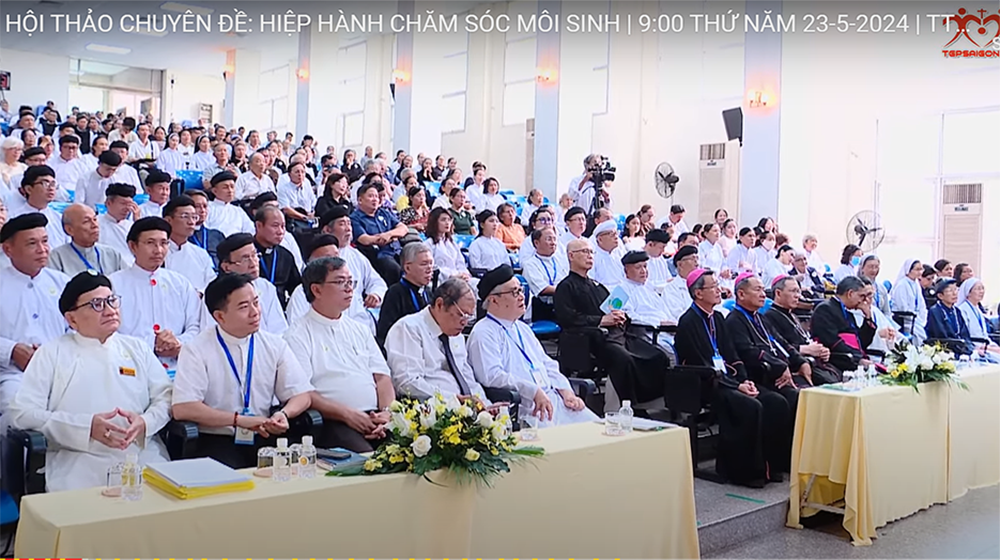
Participants from religions in Vietnam attend the gathering on May 23 in Ho Chi Minh City. (Screenshot/Joachim Pham/hdgmvietnam.com)
The bishop noted that the outer desert is devoid of human love and justice and endures environmental degradation, which is closely linked to the inner desert where people are selfish and arrogant, and fueled by insatiable desires.
"The paramount duty of our religions is to tend to the inner desert, diminishing selfishness, arrogance and ambition, thereby fostering empathy towards other people, nature and all creation," Kham said.
Thich Nu Huong Nhu from the Buddhist University based in Ho Chi Minh City placed blame for the current ecological crisis mainly on human greed, anger and ignorance, saying it is wrong to view the environment as a realm for unrestricted exploitation and indulgence.
"Despite seeming to fulfill their material desires, people experience feelings of sadness, insecurity, depression, disorientation and anguish," Nhu said.
The teacher said the solution to this problem is that believers need to return to healing their minds and bodies.
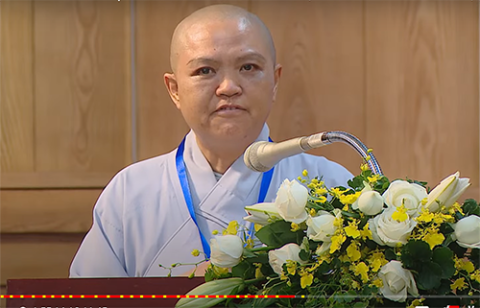
Thich Nu Huong Nhu speaks at the gathering on May 23 in Ho Chi Minh City. (Screenshot/Joachim Pham/hdgmvietnam.com)
The Buddhist nun suggested they should practice mindfulness and meditation to reconnect their bodies and minds, alleviate negative feelings of anxiety and depression, live a peaceful life, dote on all living beings and be grateful to others. They can change their lifestyles to protect the environment from pollution by living as minimalists, saving money, energy and food, minimizing toxic waste, reusing items and having a vegetarian diet, she said.
The speaker emphasized that safeguarding and cultivating trees is a collective responsibility towards rejuvenating a verdant, pristine and picturesque environment for communities. She stated that her convent has reforested more than 1,000 hectares of land in various provinces over decades, demonstrating a steadfast commitment to nurturing and preserving the Earth.
Caodaist researcher Hue Khai said followers are taught to adhere to vegetarianism and to the protection of all living beings. By abstaining from the consumption of meat and the raising of animals for food and trade, they actively contribute to the preservation of our environment.
"This practice significantly reduces greenhouse gas emissions, deforestation, water pollution and biodiversity decline, making a positive impact on the health of our planet," he told the gathering.
Khai said encouraging youth to participate in clearing sewers, collecting trash and taking care of trees in public places can foster a sense of community pride and environmental stewardship.
Noting nature is a sacred entity, and humans share a deep spiritual bond with it, he said, "This perspective instills reverence for nature into believers and empowers them to actively safeguard the environment and honor all creatures, since each possesses a spark of divine light from God."
"Through spiritual connection with nature, believers are compelled to coexist harmoniously with it, safeguard its well-being and refrain from excessive exploitation of it," he said.
Khai said they are encouraged to adopt a healthy lifestyle, pay attention to others' happiness by reducing consumerism, saving limited natural resources and developing sustainable agriculture.
He suggested that promoting interfaith cooperation in environmental conservation not only fosters friendships and mutual understanding among followers of different faiths, but also paves the way for collaboration in other important areas.
He said religions can make great contributions to environmental care by inspiring their members to recognize their common responsibility for the Earth and take action to conserve and maintain natural resources for future generations.
Khai also called on participants to work closely together to safeguard the environment under the directions of Laudato Si'.
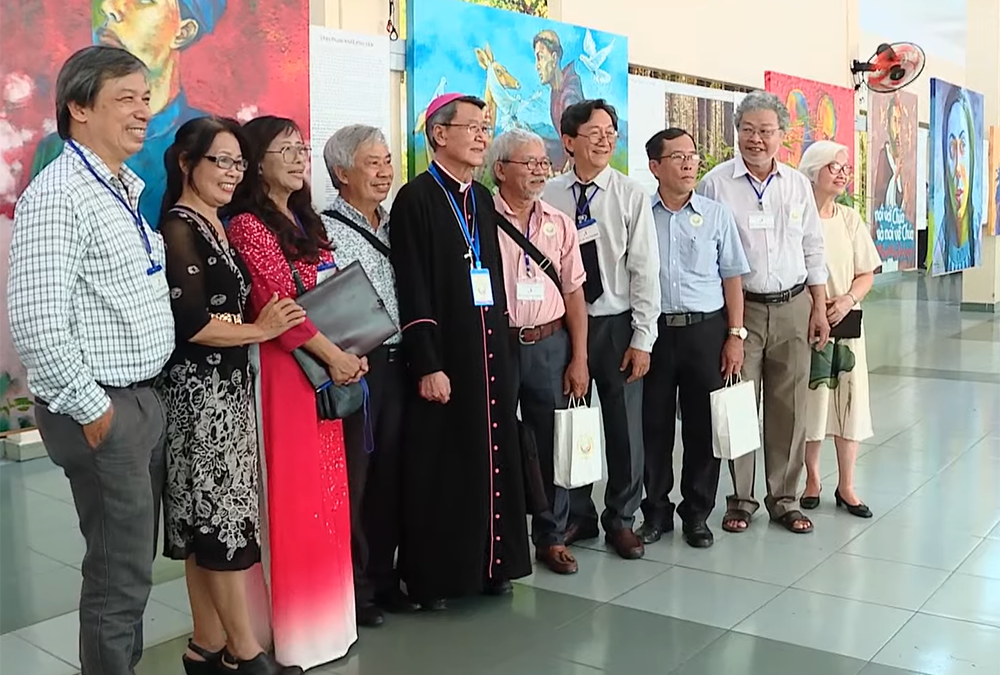
Bishop Peter Nguyen Van Kham and other participants pose for a group photo at the gathering on May 23 in Ho Chi Minh City. (Screenshot/Joachim Pham/hdgmvietnam.com)
Michiko Yoshii, a professor, highlighted the united efforts of Japanese Catholics and Buddhists in advocating for the abolition of all nuclear power plants in their nation, spurred by the tragic aftermath of the Fukushima Daiichi nuclear disaster in 2011.
Michiko, whose family had to move to stay in Vietnam for months to avoid radiological pollution caused by the nuclear accident, said in response to public outcry, the Japanese government halted its plans to export nuclear power plant projects to other countries.
"We cannot in good conscience export our grievances to other nations," she emphasized, adding this principled stance sets a powerful precedent for global cooperation towards a safer, more sustainable future.
The professor at Mie University's Center for International Education and Research in Japan hoped that "religious followers and other people in Japan continue to work together to end nuclear power production in the near future."
Indunil said the ecological crisis, one of the world's burning problems, comes from human hearts. He underscored that the key to resolving it lies within the human heart, stating, "We need to heal our heart first if we want to heal the environment."
"We need to heal our heart first if we want to heal the environment."
— Msgr. Indunil Janakaratne Kodithuwakku Kankanamalage
Addressing this challenge, he said, "We have to have a wide vision, good heart and an ecological conversion, change our hearts, and care for our nature."
He called for collaboration among religious leaders, media, governments and individuals irrespective of faith, recognizing that this crisis transcends boundaries and affects everyone.
In conclusion, Indunil urged participants to continue to "come and reflect together what concrete actions we can take to fix the problem."
The Southeast Asian country is home to 27 million religious followers, accounting for 27% of its total population, served by 54,000 religious dignitaries and 144,000 religious assistants at 30,000 worship places, according to government statistics.
